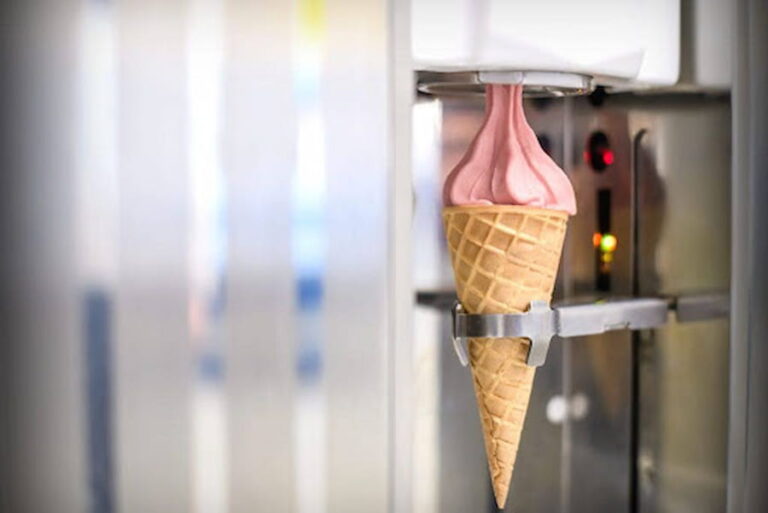If you don’t clean your ice cream machine regularly, leftovers may accumulate and cause pollution and bacterial growth. Your ice cream may eventually become sour or grainy, affecting its quality and flavor. Ignoring periodic maintenance can also put stress on the equipment’s parts, decreasing its functionality and perhaps leading to mechanical problems. For instance, old ice cream residue may cause the beater assembly to work harder, which could result in increased energy usage or even damage to the motor. Your machine will operate efficiently and consistently manufacture safe, delectable treats if you use the right cleaning supplies, such as the Taylor X24689 beater taylormate.
Health Risks Associated with Bacterial Growth
Preventing the development of bacteria is one of the main reasons for cleaning an ice cream machine on an ongoing basis. Commercial ice cream makers especially come into contact with dairy products, which, if not cleaned, can deteriorate and harbour bacteria. Proteins and sugars found in ingredients like milk and cream provide the perfect conditions for the growth of microorganism mound, and fungus if they are not thoroughly cleaned off. Salmonella and Listeria monocytogenes can grow inside the equipment if routine cleaning is neglected. Because they can result in serious gastrointestinal infections, these bacteria are very dangerous.
Low-quality ice cream
Disregarding routine cleaning might also have a detrimental effect on the ice cream’s actual quality. Remaining residue from earlier batches in the machine can combine with new ingredients and change the food’s flavour, uniformity, and general quality. Old ingredients left in the machine might get rancid and affect the newly produced batch, which can lead to sour or stale-tasting ice cream. A residue accumulation over the years may also result in uneven texture, making the ice cream either excessively thick gritty or too runny. Consumers may become disenchanted with these discrepancies, particularly if they observe variations in consistency or flavour between sessions.
Wear and tear and mechanical issues.
Complex components of ice cream makers, particularly those of the commercial variety, need to be properly maintained. The dasher, beater, and other moving parts may develop a viscous accumulation due to ingredients that remain if the machine isn’t cleaned regularly. The equipment may experience additional strain as a result of this accumulation, making it work harder than necessary. This increased strain eventually causes damage, ultimately reducing the machine’s longevity. If not cleaned regularly, sugar residue or leftover ice cream can block the beater in particular.
Higher Upkeep Expenses
In the long run, it may cost you a lot more to not clean your ice cream maker regularly. Machine parts typically wear out more quickly when sludge builds up. Working with sticky, gunky substances that get lodged in cracks and around moving parts can cause harm to the equipment’s motor and beater assembly in particular. Frequent cleansing lowers repair and upkeep fees by preventing deposits and obstructions that motivate malfunctions. You can increase the gadget’s lifespan and lower the need for high-priced maintenance or element replacements by way of taking the time to smooth it.
Problems with Energy Efficiency
Generally speaking, a clean machine performs better than a filthy one. The machine requires more energy to operate correctly when its internal components have become blocked with residue. For businesses that depend significantly on their ice cream makers, this increased energy use leads to higher power expenditures. Furthermore, the gadget may require longer to make ice cream when it isn’t always working at its exceptional which could sluggish down operations and lengthen client waiting periods. Renewable electricity is important to permit corporations to operate sustainably and save money.
Reduction in Allergen Cross-Contamination Risks
If your ice cream machine is used to make several flavours, several of which may include unusual allergens like nuts or gluten, then ordinary cleansing is vital to prevent pass-infection. Leftover ingredients from previous batches can blend with new flavours, doubtlessly causing allergic reactions in touchy individuals. Proper cleansing guarantees that each batch is safe for clients, in particular those with nutritional regulations or allergies. This responsibility is in particular essential for businesses, as failing to save you allergen contamination can result in liability problems and harm the trust of clients who rely upon secure, allergen-unfastened merchandise.
Final words
The quality of your product, the longevity of your ice cream machine, and the standing of your business can all be significantly impacted by the straightforward procedure of routinely cleaning your ice cream maker.
Visit Classyworld for more informative blogs.


